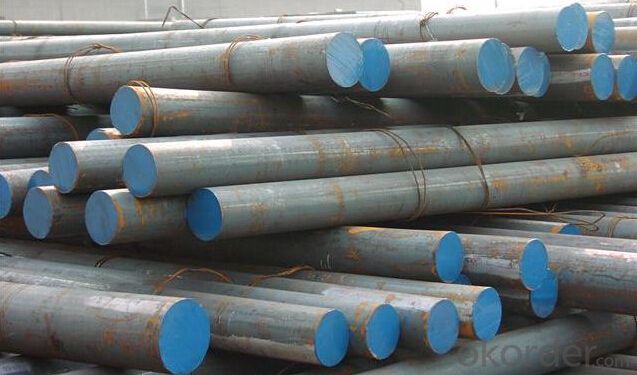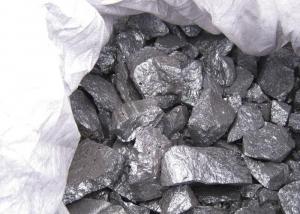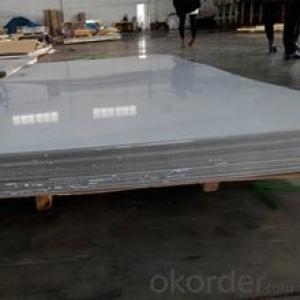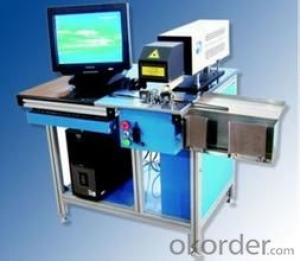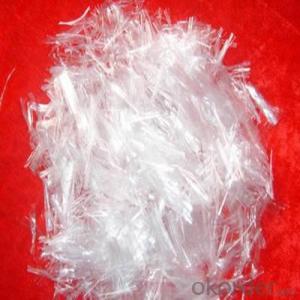JIN SUJ2 Bearing Steel of CNBM High Quality
- Loading Port:
- Tianjin
- Payment Terms:
- TT OR LC
- Min Order Qty:
- 3 m.t.
- Supply Capability:
- 100000 m.t./month
OKorder Service Pledge
OKorder Financial Service
You Might Also Like
Specification
Product Description:
ISO9001 certified
Flexible MOQ
Prompt delivery stock within 7days
MTC DIN10204
Specifications of Bearing Steel Round Bar
Grade | AISI 52100, ASTM E52100, DIN 1.3505,JIS SUJ2, GCr15 |
| Length: 2000-13000mm or as required |
Shape | Round Bar |
Type | Alloy Steel Bar |
Delivery Condition | Black Surface |
Material | Bearing Steel |
Technique | Hot Rolled |
Usage and Applications of Bearing Steel Round Bar
SAE 52100 Price is used in gauges and measuring tools, mandrels, cold rolls and flanging rolls, wood and paper processing tools, slitting blades, ball bearings and shear knives.
First the famous 1C-1.5Cr steel from which the majority of bearings are made. Its structure is apparently well-understood and the focus is on purity in order to avoid inclusions which initiate fatigue during rolling contact. Then there is the M50 steel and its variants, from which bearings which serve at slightly higher temperatures in aeroengines are manufactured, based on secondary-hardened martensite.
Tapered roller bearing are generally used to support combined load mainly consisting of radial load. Their cups are separable for easy assembling ,During mounting and using, radial clearance and axial clearance can be adjusted and preloaded mounting can be made.
Packaging & Delivery of Bearing Steel Round Bar
Packaging Detail: ASTM 52100 Steel in seaworthy packing or on customer request; Packed in bundles with standard export sea-worthy package or as customer require
Delivery Detail: 45 days after confirmed
Trade terms: FOB, CFR, CIF ou as customer's required
MOQ: 25 tons or at customer's demands. If the quantity is good, the price will be better.
Processing of Bearing Steel Round Bar
The processing of Bearing Steel Round Bar is hot rolled (strictly control sulphur, phosphorus and non-metallic inclusions content and distribution)
All products' chemical composition and specification can be design according to customers' requirement.
Note of Bearing Steel Round Bar
1. According to national standard (GB) for our products, if not, supply according to national standards (GB) or agreement.
2. We can not only provide electric furnace +LF+VD and electros lag re-melting (ESR) steel forging materials, but also forging products of piece, bar, etc.
3. Our company is equipped with roll equipment and can provide our customers with roll billets or finished.
4. Please send us your detailed specifications when inquire. We will reply to you ASAP.
5. Certificate of quality is issued in English, in addition the normal terms, production process, the mechanical property (yield strength, tensile strength, elongation and hardness. forged ratio, UT test result, Grain size, heat treatment methods and the sample of is shown on the certificate
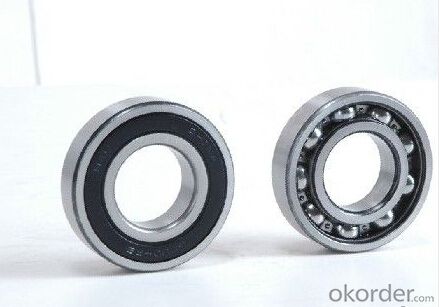
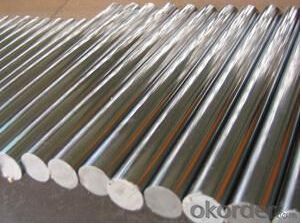
- Q: What are the main alloying elements in special steel?
- The specific type or grade of special steel can determine the main alloying elements present. Chromium, nickel, molybdenum, vanadium, tungsten, and cobalt are common alloying elements in special steel. These elements are incorporated into the steel to improve its properties, including corrosion resistance, strength, hardness, and heat resistance. Each alloying element has a distinct impact on the steel, enabling the development of specialized steel grades for diverse applications in industries like aerospace, automotive, oil and gas, and construction.
- Q: What are the different mechanical properties of special steel?
- Special steels have a variety of mechanical properties that make them unique and suitable for specific applications. Some of the key mechanical properties of special steel include high strength, excellent toughness, good wear resistance, and superior corrosion resistance. High strength is one of the most important properties of special steel. It allows the material to withstand heavy loads and stress without deformation or failure. This property makes special steel suitable for applications where structural integrity and durability are critical, such as in the construction of buildings, bridges, and machinery. Another significant mechanical property of special steel is its toughness. Toughness refers to the ability of a material to absorb energy and resist fracture under impact or sudden loads. Special steels with high toughness are essential for applications that involve dynamic and high-impact forces, such as in the manufacturing of tools, gears, and machinery components. Wear resistance is another important mechanical property of special steel. It refers to the ability of a material to resist damage and deterioration due to friction, abrasion, or erosion. Special steel with good wear resistance is commonly used in applications where it will be subjected to harsh conditions or repetitive mechanical actions, such as in the production of cutting tools, dies, and molds. Superior corrosion resistance is a valuable mechanical property of special steel, especially in environments where exposure to moisture, chemicals, or extreme temperatures is likely. Special steels with high corrosion resistance can withstand the deteriorating effects of oxidation, rust, and chemical reactions, making them suitable for applications in industries such as marine, chemical, and oil and gas. In summary, special steels possess a range of mechanical properties that set them apart from conventional steels. High strength, excellent toughness, good wear resistance, and superior corrosion resistance are some of the key mechanical properties that make special steel a preferred choice for various industrial applications.
- Q: What are the applications of special steel in the marine sector?
- Special steel is extensively used in the marine sector due to its unique properties. It is used in various applications such as shipbuilding, offshore platforms, and marine equipment manufacturing. Special steel provides excellent corrosion resistance, high strength, and durability, making it ideal for marine environments that are highly corrosive and subject to extreme conditions. It is used for constructing hulls, propeller shafts, pipelines, and various components of ships and offshore structures. Additionally, special steel's ability to withstand impact and fatigue makes it suitable for marine applications where safety and reliability are crucial.
- Q: What are the limitations of using special steel in high-stress applications?
- Using special steel in high-stress applications comes with several limitations. Firstly, the cost of special steel can be significantly higher compared to other materials, making it less feasible for projects or industries with budget constraints. Secondly, the availability and sourcing of special steel can be a challenge, leading to potential delays in production or construction timelines. This becomes problematic in high-stress applications where time is of the essence. In addition, special steel may have limitations in terms of its structural integrity. Although it is generally stronger and more resistant to wear and tear than regular steel, it still has load-bearing capacity limits. Therefore, in extremely high-stress applications, special steel may not be the most suitable choice. Moreover, working with special steel can be more difficult than working with other materials. It may require specialized equipment or techniques for cutting, welding, or shaping, thereby adding complexity and cost to the manufacturing process. Lastly, special steel may have limitations in terms of its corrosion resistance. While it is generally more resistant to corrosion compared to regular steel, it can still rust or degrade if not properly maintained or exposed to harsh environments. This is a concern in high-stress applications where the material's durability and longevity are crucial. Overall, while special steel offers many benefits in high-stress applications, it is important to carefully consider its limitations in terms of cost, availability, load-bearing capacity, workability, and corrosion resistance. These factors should be thoroughly evaluated to determine the most suitable material for a specific high-stress application.
- Q: What are the main characteristics of wear-resistant castings?
- Wear-resistant castings are specifically designed to withstand the harsh conditions of wear and abrasion. The main characteristics of these castings include: 1. Hardness: Wear-resistant castings are made from materials that have a high hardness rating. This allows them to resist deformation, surface damage, and wear caused by friction and impact. 2. Toughness: In addition to being hard, wear-resistant castings also possess high toughness. This means they can absorb energy without fracturing or breaking, ensuring their longevity and durability in challenging environments. 3. Corrosion resistance: Wear-resistant castings are often resistant to corrosion and oxidation, which helps to extend their lifespan and maintain their performance even in corrosive or high-temperature conditions. 4. Heat resistance: These castings can withstand high temperatures without losing their hardness or strength, making them suitable for applications where heat is generated or transferred, such as in industrial machinery or power plants. 5. Wear resistance: As the name suggests, the primary characteristic of wear-resistant castings is their ability to resist wear. They are designed to minimize the loss of material due to abrasion, erosion, or friction, ensuring a longer lifespan and reduced maintenance requirements. 6. Customizability: Wear-resistant castings can be customized to suit specific applications and requirements. They can be produced in various shapes, sizes, and configurations to fit different components and machinery, providing tailored solutions for wear-related challenges. Overall, the main characteristics of wear-resistant castings make them essential components in industries where wear and abrasion are prevalent, such as mining, construction, cement, and steel manufacturing. These castings help to increase the lifespan and reliability of equipment, reduce downtime, and improve overall operational efficiency.
- Q: Can special steel be used in the semiconductor manufacturing industry?
- Yes, special steel can be used in the semiconductor manufacturing industry. Special steel alloys with high levels of purity and specific properties, such as high thermal conductivity and resistance to corrosion, can be utilized in various applications within semiconductor manufacturing, including the fabrication of specialized tools, equipment, and components.
- Q: What are the properties of spring steel?
- Spring steel is a type of high carbon steel that possesses excellent elasticity and resilience, making it ideal for applications requiring strong and flexible materials. It exhibits superior strength and hardness, along with good fatigue resistance, which allows it to withstand repeated bending or twisting without deforming or breaking. Moreover, spring steel is known for its high yield strength, allowing it to store and release energy efficiently, making it suitable for various spring applications such as suspension systems, mechanical springs, and tools.
- Q: What are the main factors affecting the machinability of special steel?
- Several key factors influence the machinability of special steel, which refers to its ease of cutting, shaping, and forming. 1. The chemical composition of special steel plays a crucial role in its machinability. Elements like carbon, chromium, nickel, and molybdenum can significantly impact the material's hardness, toughness, and cutting properties. For instance, higher carbon content can increase steel's hardness, making it more difficult to machine. 2. The hardness of special steel is a critical factor in determining its machinability. Harder steels require more cutting force and generate more heat during machining, leading to increased tool wear and reduced efficiency. On the other hand, softer steels are generally easier to machine but may result in lower tool life. 3. The heat treatment process applied to special steel can greatly influence its machinability. Treatments like annealing, tempering, or quenching can alter the steel's microstructure and mechanical properties, affecting how it responds to cutting forces. Proper heat treatment can improve machinability by reducing hardness and increasing toughness. 4. The size and distribution of grains within the steel also impact its machinability. Fine-grained steel tends to have better machinability compared to coarse-grained steel, as smaller grains offer more uniform cutting conditions and reduce the risk of tool damage. 5. Machining parameters, including cutting speed and feed rate, directly affect the machinability of special steel. Higher cutting speeds can increase tool wear and generate excessive heat, affecting surface finish and dimensional accuracy. Similarly, incorrect feed rates can cause chip formation problems, resulting in poor machinability. 6. The choice of cutting tool material and geometry is crucial for achieving optimal machinability. Different tool materials, like carbide or high-speed steel, have varying wear resistance and cutting properties. The tool geometry, including rake angle and clearance angle, also affects chip formation, cutting forces, and heat generation. 7. Adequate lubrication and cooling during machining are essential to enhance machinability. Lubricants or coolants help reduce friction and heat, prolong tool life, and improve chip evacuation. Additionally, they prevent workpiece deformation and improve surface finish. Considering these factors, it is important to carefully select the appropriate special steel grade, optimize machining parameters, and use suitable cutting tools and lubrication to achieve the desired machinability and maximize productivity.
- Q: What are the different surface protection methods for special steel?
- There are several surface protection methods available for special steel, each with its own advantages and applications. Here are some of the most common methods: 1. Coating: Coating is a widely used method to protect the surface of special steel. This can involve applying a layer of paint, powder coating, or electroplating. Coatings provide a barrier between the steel and the environment, preventing corrosion and enhancing the aesthetics of the steel surface. 2. Galvanization: Galvanization involves coating the special steel with a layer of zinc through a process called hot-dip galvanizing. This method provides excellent corrosion resistance and is commonly used for outdoor structures and equipment exposed to harsh environments. 3. Passivation: Passivation is a chemical process that removes surface contaminants and forms a protective oxide layer on the special steel's surface. This method improves the steel's resistance to corrosion and is often used for stainless steel. 4. Nitriding: Nitriding is a heat-treatment process that diffuses nitrogen into the surface of the special steel, forming a hard and wear-resistant layer. This method enhances the steel's durability, resistance to fatigue, and corrosion resistance, making it suitable for applications involving heavy loads or abrasive environments. 5. PVD and CVD coatings: Physical Vapor Deposition (PVD) and Chemical Vapor Deposition (CVD) are methods used to deposit thin films of various materials onto the special steel surface. These coatings can provide enhanced hardness, wear resistance, and low friction properties, making them ideal for cutting tools, molds, and high-performance applications. 6. Shot peening: Shot peening is a mechanical surface treatment method that involves bombarding the special steel surface with small spherical particles. This process induces compressive stresses in the steel, improving its fatigue life, resistance to stress corrosion cracking, and wear resistance. 7. Anodizing: Anodizing is a process used primarily for aluminum, but it can also be applied to some special steel alloys. By creating an oxide layer on the surface, anodizing improves corrosion resistance and allows for the application of decorative finishes. Each of these surface protection methods offers unique properties and benefits, and the choice of method depends on the specific requirements of the special steel application.
- Q: What are the properties of high-strength steel?
- High-strength steel possesses a range of properties that make it desirable for various applications. It is known for its exceptional strength-to-weight ratio, allowing for lighter and more efficient structures. Additionally, high-strength steel offers excellent durability, toughness, and resistance to fatigue, making it suitable for withstanding heavy loads and extreme conditions. Moreover, this type of steel exhibits good weldability and formability, allowing for ease of fabrication. Overall, the properties of high-strength steel enable it to provide enhanced performance, structural integrity, and cost-effectiveness in a wide array of industries.
Send your message to us
JIN SUJ2 Bearing Steel of CNBM High Quality
- Loading Port:
- Tianjin
- Payment Terms:
- TT OR LC
- Min Order Qty:
- 3 m.t.
- Supply Capability:
- 100000 m.t./month
OKorder Service Pledge
OKorder Financial Service
Similar products
Hot products
Hot Searches
Related keywords


